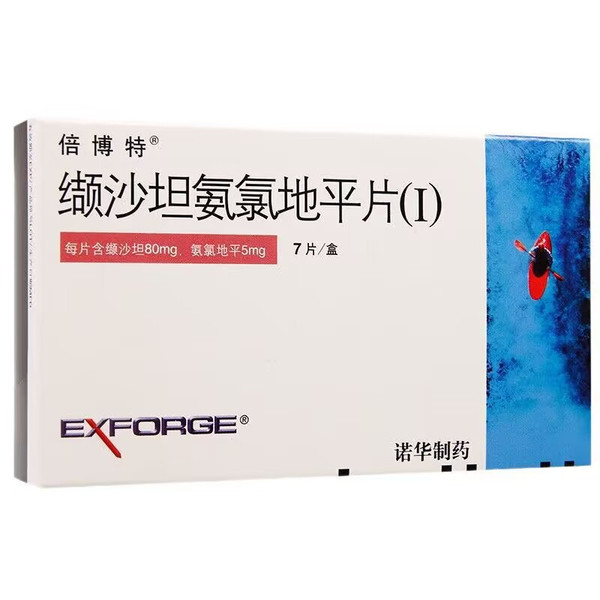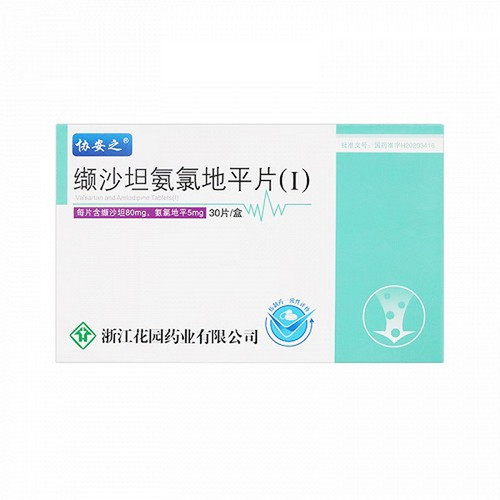Product Overview
[Drug Name]
Generic Name: Valsartan and Amlodipine Tablets (I)
Trade Name: BeiBoTe
English Name: Valsartan and Amlodipine Tablets (I)
Chinese Pinyin: XieShaTanAnLvDiPingPian(I)(BeiBoTe)
[Ingredients]
This product is a combination preparation. Each tablet contains 80 mg of valsartan and 5 mg of amlodipine.
[Properties]
This product is a film-coated tablet. When the film coating is removed, the tablet appears white.
[Indications]
Treatment of essential hypertension. This product is used for patients whose blood pressure cannot be adequately controlled with monotherapy.
[Dosage and Administration]
Amlodipine 2.5-10 mg once daily is effective for the treatment of hypertension, while the effective dose of valsartan is 80-320 mg. In clinical trials of once-daily valsartan and amlodipine tablets, using 5-10 mg of amlodipine and 80-320 mg of valsartan, antihypertensive efficacy increased with increasing doses. 1. Patients whose blood pressure is not adequately controlled with monotherapy can be switched to Bebot. 2. Add-on therapy: Patients whose blood pressure is not adequately controlled with amlodipine or valsartan monotherapy can be switched to combination therapy with Bebot. 3. Patients who experience dose-limiting adverse reactions with amlodipine or valsartan monotherapy can be switched to Bebot, using a lower dose of the single component combined with the other component to achieve blood pressure control. 4. Alternative therapy: For ease of dosing, patients receiving amlodipine and valsartan combination therapy can be switched to the same dose of Bebot. For information on discontinuing beta-blockers, see Precautions. Amlodipine and valsartan can be taken with or without food. It is recommended that Bebot be taken with water. Hepatic and Renal Impairment: No dose adjustment is required for patients with mild to moderate renal impairment. Patients with severe renal impairment should use valsartan with caution (see Contraindications). Bebotel should also be used with caution in patients with hepatic impairment or biliary obstructive disease (see Precautions).
[Adverse Reactions]
The safety of this product has been evaluated in five controlled clinical trials involving a total of 5,175 patients, of which 2,613 received valsartan and amlodipine in combination. The safety of valsartan and amlodipine tablets has been evaluated in over 2,600 hypertensive patients; over 1,440 patients received treatment for more than six months and over 540 patients received treatment for more than one year. Adverse reactions are generally mild and transient, rarely requiring discontinuation of treatment. The overall incidence of adverse reactions is dose-independent and unrelated to gender, age, and race. In placebo-controlled clinical studies, 1.8% of patients in the valsartan and amlodipine tablets group discontinued treatment due to side effects, compared with 2.1% of patients in the placebo group. The most common reasons for discontinuation were peripheral edema (0.4%) and dizziness (0.2%). In placebo-controlled clinical trials, adverse reactions occurring in at least 2% of patients receiving this product and occurring more frequently in the valsartan/amlodipine tablets group (n=1437) than in the placebo group (n=337) included: peripheral edema (5.4% vs. 3.0%), nasopharyngitis (4.3% vs. 1.8%), upper respiratory tract infection (2.9% vs. 2.1%), and dizziness (2.1% vs. 0.9%). Orthostatic events (orthostatic hypotension and postural dizziness) occurred in less than 1% of patients. Other adverse reactions (≥0.2%) occurring in the valsartan/amlodipine tablets group in placebo-controlled clinical trials are listed below. It is not possible to determine whether these adverse reactions are attributable to this product. (See package insert for details.)
[Contraindications]
This product is contraindicated in patients with a hypersensitivity to the active ingredient or any of the excipients. This drug is contraindicated in pregnant and lactating women (see [Use in Pregnant and Lactating Women]). There are currently no data on its use in patients with severe renal impairment (creatinine clearance 10 ml/min). This drug should be contraindicated in patients with hereditary angioedema and those who develop angioedema early in treatment with ACE inhibitors or angiotensin II receptor antagonists.
[Precautions]
1. Hypotension: In placebo-controlled trials, 0.4% of patients with uncomplicated hypertension treated with valsartan and amlodipine tablets experienced excessive hypotension. Patients with an activated renin-angiotensin system (e.g., those with volume and/or salt depletion taking high-dose diuretics) may experience symptomatic hypotension when receiving angiotensin II receptor antagonists. Correction of volume depletion prior to initiating this drug or close clinical monitoring at the initiation of treatment are recommended. Caution should be exercised when initiating treatment in patients with heart failure or a recent myocardial infarction, and in patients undergoing surgery or dialysis. Valsartan administration to patients with heart failure or post-myocardial infarction often causes a decrease in blood pressure, but if dosing instructions are adhered to, discontinuation of treatment due to persistent symptomatic hypotension is generally unnecessary. In controlled clinical trials in patients with heart failure, the incidence of hypotension was 5.5% in patients receiving valsartan and 1.8% in the placebo group. In the Valsartan Acute Myocardial Infarction Trial (VALIANT), the incidence of permanent discontinuation of treatment due to hypotension in post-myocardial infarction patients was 1.4% in the valsartan group and 0.8% in the captopril group. 2. Increased Risk of Myocardial Infarction or Angina: Rarely, patients (particularly those with severe obstructive coronary artery disease) may experience an increase in the frequency, duration, or severity of angina or acute myocardial infarction when initiating or increasing the dose of calcium channel blockers. The mechanism of this effect is unknown. 3. Hepatic Impairment. 4. Amlodipine Studies: Amlodipine is extensively metabolized by the liver. In patients with hepatic impairment, the plasma elimination half-life (t½) is 56 hours. Therefore, amlodipine should be used with caution in patients with severe hepatic impairment. 5. Valsartan Studies: Valsartan is primarily eliminated via bile. Valsartan exposure (measured by AUC) in patients with mild to moderate chronic liver disease, including those with biliary obstructive disease, averaged twice that of healthy volunteers (matched for age, sex, and weight). This product should be used with caution in patients with liver disease or biliary obstructive disease. (See package insert for details.) Please read the package insert carefully and use as directed by your healthcare provider.
[Use in Special Populations]
Precautions for Use in Pediatric Patients:
The safety and efficacy of this product in pediatric patients have not been established.
Precautions for Pregnancy and Lactation:
Women of Childbearing Potential: As a direct-acting drug on the renin-angiotensin-aldosterone system (RAAS), Exforge should be contraindicated in women planning pregnancy. When prescribing medications that act on the RAAS, healthcare professionals should inform women of childbearing age of the potential risks of taking these medications during pregnancy. Pregnancy: As a medication that directly acts on the RAAS, this medication should not be used by pregnant women (contraindications). Given the mechanism of action of angiotensin II antagonists, fetal harm cannot be ruled out. There have been reports of harm to the developing fetus or fetal death when angiotensin-converting enzyme inhibitors (a specific class of medications that act on the RAAS) are administered intrauterine during the second and third trimesters of pregnancy. Furthermore, retrospective data have shown that administration of angiotensin-converting enzyme inhibitors (ACE inhibitors) (a specific class of medications that act on the RAAS) in utero during pregnancy can cause harm to the developing fetus or even lead to fetal death. Furthermore, in pregnant women, there have been reports of increased risk of ACE inhibitors in the elderly.
Precautions for Elderly Patients:
In controlled clinical studies, 323 (22.5%) hypertensive patients treated with this medication were ≥65 years of age, and 79 (5.5%) were ≥75 years of age. No overall differences in the efficacy and safety of this medication were observed in this patient population, but greater sensitivity to the medication in some elderly patients cannot be ruled out. Amlodipine: In studies with amlodipine besylate tablets, there were insufficient numbers of subjects aged 65 years and older to determine whether they respond differently to the drug than younger subjects. Other clinical experience has not revealed any differences in responses between elderly and younger patients. In general, the dose of a drug should be selected cautiously in elderly patients, generally starting at the lowest dose. Elderly patients have a higher incidence of impaired hepatic, renal, and cardiac function and often have other medical conditions or are receiving other medications. Amlodipine clearance is decreased in elderly patients, resulting in an approximately 40-60% increase in the AUC. Therefore, a lower starting dose of 2.5 mg/day is typically used when treating elderly patients with amlodipine. Valsartan: In controlled clinical studies of valsartan, 1214 (36.2%) of the hypertensive patients receiving valsartan were 65 years or older, and 265 (7.9%) were 75 years or older. No overall differences in the efficacy or safety of valsartan were observed in this patient population, but greater sensitivity to the drug in some elderly individuals cannot be ruled out.
[Drug Interactions]
Amlodipine can be used concomitantly with thiazide diuretics (α-blockers, β-blockers, angiotensin-converting enzyme inhibitors, long-acting nitrates, sublingual nitroglycerin, nonsteroidal anti-inflammatory drugs (NSAIDS), antibiotics, and oral hypoglycemic agents. Calcium channel blockers can interfere with the cytochrome P450-dependent metabolism of theophylline and ergotamine. Since no in vivo or in vitro interaction data are available for the combined use of amlodipine with theophylline or ergotamine, regular monitoring of theophylline or ergotamine plasma concentrations is recommended upon initiation of coadministration. In vitro studies in human plasma have shown that amlodipine does not affect the plasma protein binding of digoxin, phenytoin, coumarin, warfarin, and indomethacin. Special Studies: Effects of Other Active Ingredients on Amlodipine. Cimetidine: The concomitant use of amlodipine and cimetidine did not alter the pharmacokinetics of amlodipine. Grapefruit juice: 20 healthy subjects. Studies in healthy volunteers have shown that coadministration of 240 mL of grapefruit juice with a single dose of amlodipine (5 mg or 10 mg) slightly increases the Cmax and AUC of amlodipine. Aluminum/magnesium (antacids) Coadministration of aluminum/magnesium antacids with a single dose of amlodipine has no significant effect on the pharmacokinetics of amlodipine. In patients with essential hypertension, a single dose of sildenafil (100 mg) did not affect the pharmacokinetic parameters of amlodipine. When amlodipine and sildenafil are coadministered, each drug exerts its own antihypertensive effect independently. Special Studies: Effects of Amlodipine on Other Active Ingredients. Atorvastatin: Multiple doses of amlodipine (10 mg) combined with atorvastatin (80 mg) did not significantly alter the steady-state pharmacokinetic parameters of atorvastatin. Digoxin studies in healthy volunteers have shown that coadministration of amlodipine with digoxin did not alter digoxin plasma concentrations or renal clearance. Ethanol (alcohol) ) Single and multiple doses of amlodipine (10 mg) had no significant effect on the pharmacokinetics of ethanol. When warfarin and amlodipine were co-administered, warfarin had no significant effect on the prothrombin time in healthy male volunteers. Pharmacokinetic studies of cyclosporine showed that amlodipine had no significant effect on the pharmacokinetics of cyclosporine. No significant drug interactions have been found in clinical practice with valsartan. The following drugs have been studied: cimetidine, warfarin, furosemide, digoxin, atenolol, indomethacin, hydrochlorothiazide, amlodipine, and glibenclamide. Because valsartan is almost not metabolized, no clinical interactions with drugs that induce or inhibit the cytochrome P450 system have been found. Although valsartan is largely bound to plasma proteins, in vitro experiments have not found it to interact with other plasma protein-bound drugs (such as diclofenac, furosemide, and warfarin) at this level. There is no experience in the co-administration of valsartan with lithium. Therefore, it is recommended that serum lithium levels be regularly monitored when valsartan is used in combination with lithium. When used in combination with potassium-sparing diuretics (such as spironolactone, triamterene, and amiloride), potassium supplementation or the use of potassium-containing preparations can lead to elevated serum potassium levels and, in patients with heart failure, elevated serum creatinine. Therefore, caution is advised when using these medications together.
[Pharmacological Action]
This product contains two antihypertensive active ingredients, valsartan and amlodipine, which have complementary mechanisms of action in controlling blood pressure. Amlodipine is a calcium channel blocker, while valsartan is an angiotensin II antagonist. The combined antihypertensive effect of these two ingredients is superior to that of either ingredient alone. (See package insert for details.)
[Storage]
Sealed.
[Strength]
80mg: 5mg x 7 tablets
[Packaging Size]
Box
[Expiration Date]
36 months
[Approval Number]
National Medicine Standard No. J20150135
[Manufacturer]
Company Name: Novartis Farmaceutica S.A., Spain








